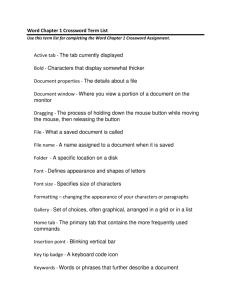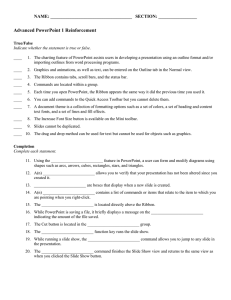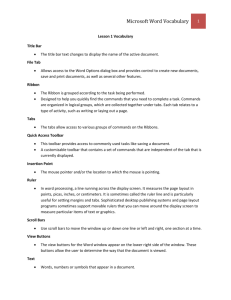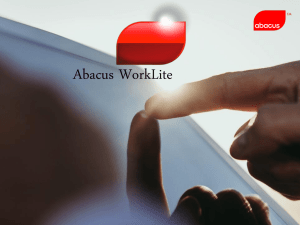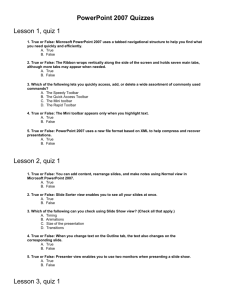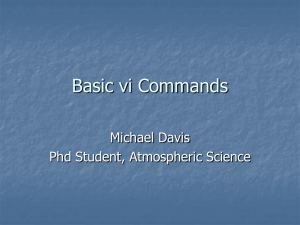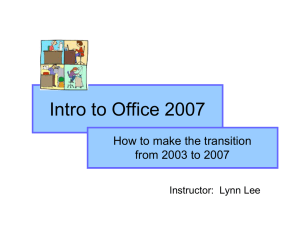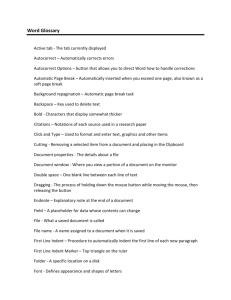Microsoft® Office Training
advertisement
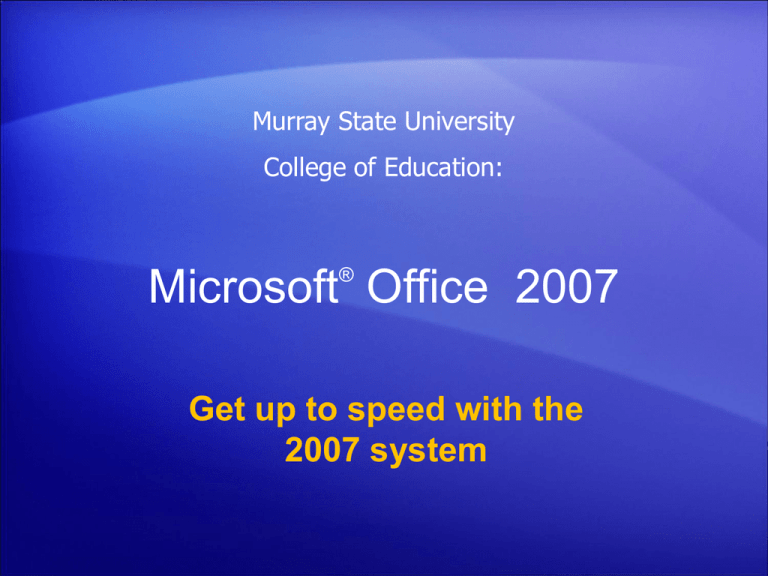
Murray State University College of Education: ® Microsoft Office 2007 Get up to speed with the 2007 system The new Office: Made for you Video Intro Video of Office 2007 Features The 2007 Office System The new Office: Made for you When you open a 2007 Microsoft Office system program, you’ll notice a new look at the top of the window. Button The Button has many of the commands found in the “old” File Tab. The 2007 Office System The new Office: Made for you Commands such as New, Open, Save and Print are accessed from the button. Button Commands (Word) The 2007 Office System What about the new file formats? Word 2007, Excel 2007, and PowerPoint 2007 use new file formats. The 2007 Office System What about the new file formats? A bit more about the new format in Word, Excel, and PowerPoint: • For documents, workbooks, and presentations, the default file format now has an “x” on the end • Word (.doc now .docx) • PowerPoint (.ppt now .pptx) • Excel (.xls now .xlsx) The 2007 Office System Working with files from earlier versions All files you use/receive, etc. will no longer be in the same format. Don’t worry, you can still share documents between the 2007 Office system and earlier versions of Office programs. The 2007 Office System Working with files from earlier versions Here’s how: • You can open a file created in previous versions of Office programs, from 95 through 2003. Just open the file as usual. – After working with it in the 2007 version, you may want to save the file. By default, the Save As dialog box saves a file created in a previous version as that same version. – As you save, a Compatibility Checker will let you know of any new features added to the file that may be disabled, or matched as closely as possible. The 2007 Office System Working with files from earlier versions Here’s how: • Colleagues who have Word, Excel, or PowerPoint versions 2000 through 2003 (and the latest patches and service packs) can open 2007 files. – When they open your document, they will be asked if they want to download a converter that will let them open your document. – If you share documents with people who will have problems, you can still use save as options to save in earlier formats, or as rtf, pdf, etc. The 2007 Office System What about the new file format in Access? The new file format in Access 2007, .accdb, supports new product features. Prior versions of Access cannot open Access 2007 files! Example of New Product Feature— Access 2007 lets you store documents and files as compressed attachments in your database. The 2007 Office System The new Office: Made for you Commands such as New, Open, Save and Print are accessed from the button. Button Commands (Word) Frequently used commands can be added to the Quick Access Toolbar The 2007 Office System Put commands on your own toolbar Do you often use commands that aren’t as quickly available as you’d like? You can easily add them to the Quick Access Toolbar. Animation: Right-click, and click Play. Located above the Ribbon when you first start your Microsoft Office program, the Quick Access Toolbar puts commands where they’re always visible and near at hand. The 2007 Office System Put commands on your own toolbar Do you often use commands that aren’t as quickly available as you’d like? You can easily add them to the Quick Access Toolbar. Located above the Ribbon when you first start your Microsoft Office program, the Quick Access Toolbar puts commands where they’re always visible and near at hand. The 2007 Office System The new Office: Made for you Commands such as New, Open, Save and Print are accessed from the button. Button Commands (Word) The Options Tab at the bottom allows default changes. The 2007 Office System Where do I start a blank document? When you create a new document, workbook, presentation, or database, you’ll get a full, colorful window to help you begin. You can start with a blank or existing file, as you’re accustomed to doing. Or to jump-start your authoring work, look on the left. Under Microsoft Office Online, click Featured, and choose from the catalog of links to online templates and training courses. The 2007 Office System The new Office: Made for you Yes, there’s a lot of change to familiar Microsoft Office programs. But it’s good change. With the Ribbon, commands and other tools you need are now exposed and more readily available. The 2007 Office System What’s on the Ribbon? The three parts of the Ribbon are tabs, groups, and commands. 1 Tabs sit across the top of the Ribbon. Each one represents core tasks you do in a given program. 2 Groups are sets of related commands. They remain on display and readily available, giving you rich visual aids. 3 Commands are arranged in groups. A command can be a button, a menu, or a box where you enter information. The 2007 Office System What’s on the Ribbon? How do you get started? Begin with the first tab. In Word 2007, for example, that’s the Home tab. It’s got the commands that people use most commonly when they write documents: font formatting commands (Font group), paragraph options (Paragraph group), and text styles (Styles group). The 2007 Office System How commands are organized Commands are organized by how they’re used. Frequently used core commands no longer have to share space with a range of remotely related commands on a menu or toolbar. They’re the ones that get used, and so now they’re the ones most prominently featured. The 2007 Office System More commands, but only when you need them Commands you use most are available on the Ribbon all the time. Others appear only when you need them, in response to an action you take. For example, the Picture Tools in Word appear on the Ribbon when you insert a picture, and they go away when you’re done. The Ribbon responds to your action. So don’t worry if you don’t see all the commands at all times. Take the first steps, and what you need will appear. The 2007 Office System More options if you need them Sometimes an arrow, called the Dialog Box Launcher, appears in the lower-right corner of a group. This means more options are available for the group. For example, to get to a less commonly used font option in PowerPoint® 2007: 1 On the Home tab, click the arrow in the Font group. 2 The Font dialog box opens, with the full selection of font commands. The 2007 Office System Preview before you select Are you familiar with the try-undo-try cycle? You make a change, it’s not what you want, and so you undo and keep trying until you get what you had in mind. Animation: Right-click, and click Play. Now you can see a live preview of your choice before you make a selection, which saves you time and gives you better results. The 2007 Office System Preview before you select Are you familiar with the try-undo-try cycle? You make a change, it’s not what you want, and so you undo and keep trying until you get what you had in mind. Now you can see a live preview of your choice before you make a selection, which saves you time and gives you better results. The 2007 Office System What about favorite keyboard shortcuts? What about the old keyboard shortcuts? Keyboard shortcuts of old that begin with CTRL are still intact, and you can use them as you always have. For example, the shortcut CTRL+C still copies something to the clipboard, and the shortcut CTRL+V still pastes something from the clipboard. The 2007 Office System What if I can’t find a command? [Author: .swf gets inserted here; delete this placeholder before inserting .swf file.] If you can’t find the command you’re looking for, there’s help. Pull up the Help Menu by pressing F1. Animation: Right-click, and click Play. For Word 2007, Excel 2007, and PowerPoint 2007, there’s a visual, interactive reference guide to help you quickly learn where things are. The 2007 Office System Resources for COE Resource Web Page http://coekate.murraystate.edu/kate/pdresources/71/ Summary of changes made to Office 2007 Quick Reference Card Credits: PowerPoint adapted for COE from Microsoft Powerpoint; original downloaded from http://office.microsoft.com/en-us/training/HA101926501033.aspx The 2007 Office System
